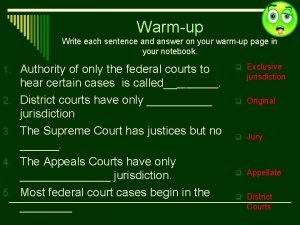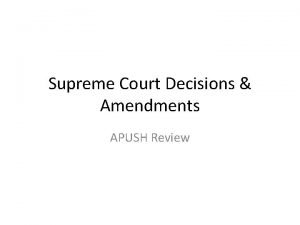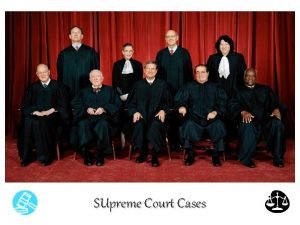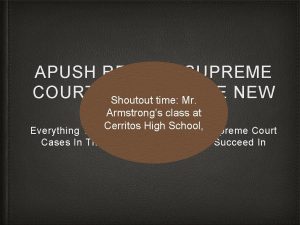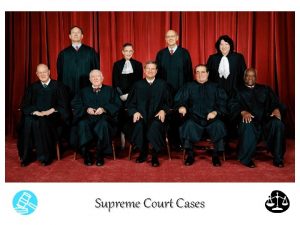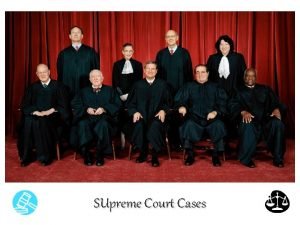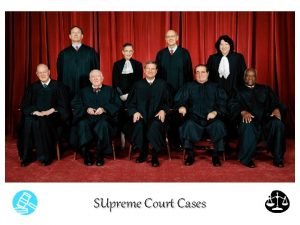TOP 15 SUPREME COURT CASES Cases description year





- Slides: 5

TOP 15 SUPREME COURT CASES Cases, description, year

SC Cases ■ Mc. Culloch v. Maryland 1819 - Established supremacy of the U. S. Constitution and federal laws over state laws; national bank is constitutional ■ U. S. v. Lopez 1995 - Congress may not use the commerce clause to make possession of a gun in a school zone a federal crime ■ Engel v. Vitale 1962 - School sponsorship of religious activities violates the establishment clause; school sponsored prayer is unconstitutional ■ Wisconsin v. Yoder 1972 - Compelling Amish students to attend school past the eighth grade violates the free exercise clause ■ Tinker v. Des Moines 1969 - public school students have the right to wear black armbands in school to protest the Vietnam War

SC Cases ■ New York Times v. U. S. 1971 - Bolstered the freedom of the press, establishing a “heavy presumption against prior restraint” even in cases involving national security ■ Schenck v. U. S. 1919 - Speech creating a “clear and present danger” is not protected by the First Amendment ■ Gideon v. Wainwright 1963 - Guaranteed the right to an attorney for the poor or indigent ■ Roe v. Wade 1973 - Extended the right of privacy to a woman’s decision to have an abortion ■ Mc. Donald v. Chicago 2010 - The Second Amendment right to keep and bear arms for selfdefense is applicable to the states

SC Cases ■ Brown v. Board of Edu. 1954 - Race-based school segregation violates the equal protection clause ■ Citizens United v. Federal Election Commission 2010 - Political spending by corporations, associations, and labor unions is a form of protected speech under the First Amendment ■ Baker v. Carr 1961 - Opened the door to equal protection challenges to redistricting and the development of the “one person, one vote” doctrine by ruling that challenges to redistricting did not raise “political questions” that would keep federal courts from reviewing such challenges ■ Shaw v. Reno 1993 - Legislative redistricting must be conscious of race and ensure compliance with the Voting Rights Act of 1965 ■ Marbury v. Madison 1803 –Established principle of judicial review empowering the SC to nullify an act of the legislative or executive branch that violates the Constitution


